实用英语语法笔记
英语语法知识点总结

英语语法知识点总结1. 主谓一致:主谓要在人称和数上保持一致。
例如,第三人称单数主语与动词本身要用第三人称单数形式,例如he likes。
2. 时态:表示动作发生的时间。
常见的时态有一般现在时、一般过去时、一般将来时、现在进行时等。
例如,I am studying now.3. 语态:用于表示主动或被动的动作。
常见的语态有主动语态和被动语态。
例如,The boy kicked the ball (主动语态) vs The ball was kicked by the boy (被动语态)。
4. 倒装句:将句子的主语和谓语的位置颠倒。
常见的倒装句有完全倒装句和部分倒装句。
例如,Never have I seen such a beautiful sunset (完全倒装句) vs Not only is she beautiful, but she is also intelligent (部分倒装句)。
5. 并列句:指两个或更多个在意义上并列的句子。
并列句通常可以使用连词and、but、or等连接。
例如,I like to play tennis and my brother likes to play basketball.6. 从句:一个句子中包含一个独立从句和一个或多个从属从句。
常见的从句有名词性从句(作主语、宾语、表语等)和定语从句(对名词进行修饰)。
例如,I don't know where she went(名词性从句) vs The car that is parked outside is mine (定语从句)。
7. 直接引语和间接引语:直接引语是直接引用说话者的原话,用引号括起来;间接引语是用自己的话转述他人的话,不需要引号。
例如,He said, "I am tired" (直接引语) vs He said that he was tired (间接引语)。
英语语法笔记

英语语法笔记-CAL-FENGHAI.-(YICAI)-Company One1直接引语与间接引语引述别人的话语一般采用两种方式:⑴直接引述别人地原话,把它放在引号内,这叫直接引语;⑵用自己的话转述别人的话,这叫间接引语,间接引语相当于一个宾语从句。
(二)人称在间接引语中的变化:直接引语中的人称代词在转化为间接引语时,也要有相应地变化。
一般遵循“一随主,二随宾,第三人称不更新”的原则。
(三)指示代词,时间状语,地点状语,动词在间接引语中的变化。
(四)句子结构的变化:①直接引语是陈述句,变为间接引语时,用连接词that(也可以省略),同时人称时态,时间状语,地点状语作相应变化。
[ I’ll telephone him this evening ] she said.改后:she told me that she would telephone him that evening.Mr Black said [ I made the plan yesterday afternoon ].改后:Mr Black said that he had made the plan the previous afternoon.[ I am living here now. ] she said.改后:She said that she was living there then.②直接引语是一般疑问句,变为间接引语是,用whether/if 引导,疑问语序变为陈述语序,同时人称、时态、时间状语、地点状语作相应变化。
谓语said 通常变为asked。
She asked Tom [ Are you going to Beijing next week]改后:She asked Tom wether he was going to Beijing the next week.He asked us [ Can I stay here for another two days]改后:He asked us if he could stay there for another two days.③直接引语是特殊疑问句,变为间接引语时,用原来的疑问句引导,疑问语序变为陈述语序,同时人称,时态,时间状语,地点状语作相应变化。
最全的英语语法笔记整理,小学到初中都能用得到

最全的英语语法笔记整理,小学到初中都能用得到!
众所周知,英语语法是整个学习英语中的一个重点。
尤其小学阶段的英语教学重在激发和培养学生的学习兴趣,引导学生英语学习的正确方法。
那么,孩子整理上课笔记的好坏直接影响着英语的学习效果。
如果小学英语的基础扎实,对今后的学习会有很大的帮助。
下面小编整理了最全的英语语法笔记整理,小学到初中都能用得到!
—代词—
—动词—
—非谓语词—
—副词—
—冠词—
—介词—
—连词—
—名词—
—情态动词—
—时态—
—数词—
—形容词—------。
张道真实用英语语法学习笔记第四章冠词

第4章冠词4 . 1 . 1定冠词和不定冠词冠词是一种虚词,不能独立担任一个成分,只能附着在一个名词上,帮助说明其词义,英语中有两个冠词:1) 定冠词(The Definite Article) 即 the;2) 不定冠词(The Indefinite Article) 即 a和 an。
the通常读作/ds/,在元音前读作/di/,特别强调或单念时读作/di:/:谁是这书的作者?Who is the /di/ author of the /ds/ book?他是那时代最伟大的诗人。
He was the /di:/ greatest poet of the /di/ age.不定冠词在元音(指音,不指元音字母)前用an这个形式,读作/3n/:在其他情况下一槪作a,读作“/:a girl /s ’g3:l/a red apple /a "red jSepl/a university /9 ju:mV3:siti/ a one-act play /3 •wAiiaekt丨plei/a European city /〇 Jusrs'piisn rsiti/ a humble man /a'hAmbl ^aen/4- 1-2 冠词的基本意义不定冠词a(n)与数词one同源,表示“一个”的意思,用在可数名词单数前:她是个护士,在一家医院工作。
She is a nurse. She works in a hospital.他是一位英国人,有一个爱尔兰妻子。
He is an Englishman,with an Irish wife.定冠词the,与this和that同源,有“这(那)个”的意思,但比较弱,表示一(几)个特定的人或东西,有时可译作“这个(些)”或“那个(些)”:这就是你要的那本书。
That’s the book you want.那边那个年轻人是谁?Who is the young man over there?中间这位老太太是我的祖母。
必备英语语法笔记整理
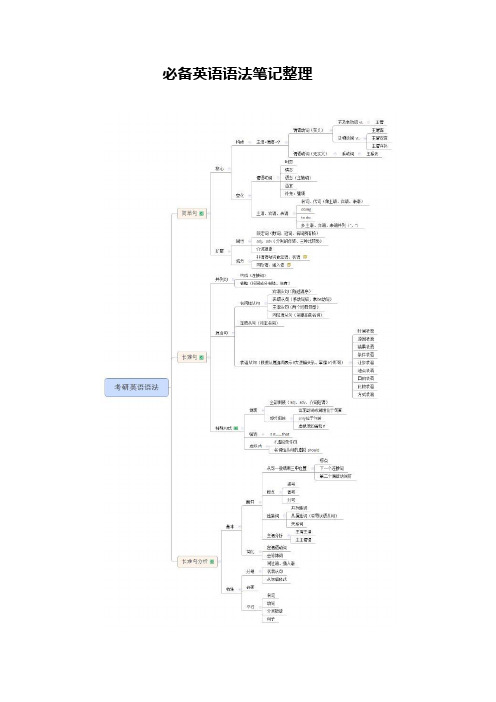
必备英语语法笔记整理好长好长的思维导图,真的值得一看,弄这个可是很累的呢。
1.简单句简单句是长难句的基础,只表达了一件事的句子(当然,有的时候存在会加很多修饰,从而使句子看着有些复杂)。
书中主要是从其核心与扩展两方面对简单句进行讲解。
1.1核心核心又分为构成与变化。
1.1.1构成构成中主要是归纳了简单句的五种核心构成(如导图,不累赘。
)其中,主要根据动词的词义分为实义动词与非实义动词。
实义是指,该动词有实际意义,如:swim、play、eat……其中,实义动词又分为及物动词与非及物动词两类。
及物动词(vt.)与非及物动词(vi.)的区别在于该动作主语是否可以独立完成。
若可以,则为不及物动词。
若需要加上对象,则为及物动词。
非实义,自然是指无实际意义的系动词。
总结如下:注:1.简化句子:找到不及物动词,就可以判断出后面不需要接宾语,主谓结构的句子核心已完成,则其后无核心成分,可以忽略不看。
2.找到分裂结构:找到及物动词,就可以判断出需要后接宾语。
在长难句中,本该跟在及物动词后的宾语被移走,造成了动宾的分裂。
3.判断从句:找到及物动词或系动词,就可以判断后面的成分是宾语或表语。
若是接从句,也就可判断从句类型。
1.1.2变化变化主要是指谓语动词的变化,以及指主语、宾语和表语等成分可以由名词、代词、doing、to do等表示。
同时,讲到了多主语与宾语的并列。
时态= 时间+状态。
考研中常考的是一般过去时(did)、一般现在时(do/does)、一般将来时(will do /am,is,are going to do)、一般过去将来时(would do/was,were going to do)、过去进行时(was,were doing)、现在进行时(am,is,are doing)、过去完成时(had done)、现在完成时(have done)。
情态动词用法两种:1.表达“情绪和态度”。
2.表达“推测”。
学习笔记——英语语法的八大时态
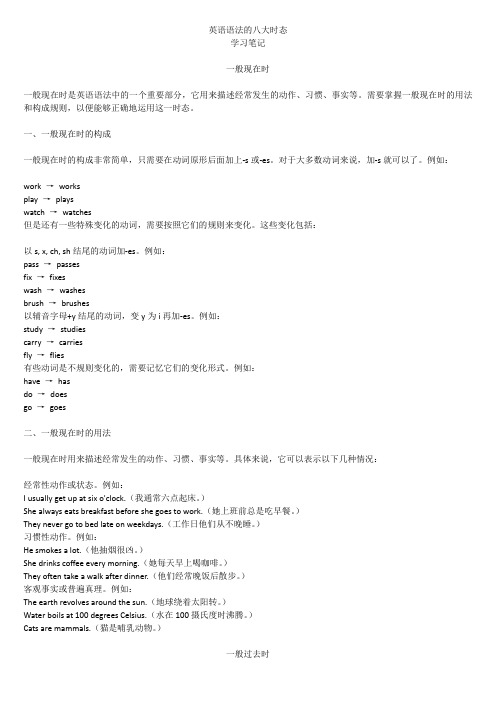
英语语法的八大时态学习笔记一般现在时一般现在时是英语语法中的一个重要部分,它用来描述经常发生的动作、习惯、事实等。
需要掌握一般现在时的用法和构成规则,以便能够正确地运用这一时态。
一、一般现在时的构成一般现在时的构成非常简单,只需要在动词原形后面加上-s或-es。
对于大多数动词来说,加-s就可以了。
例如:work →worksplay →playswatch →watches但是还有一些特殊变化的动词,需要按照它们的规则来变化。
这些变化包括:以s, x, ch, sh结尾的动词加-es。
例如:pass →passesfix →fixeswash →washesbrush →brushes以辅音字母+y结尾的动词,变y为i再加-es。
例如:study →studiescarry →carriesfly →flies有些动词是不规则变化的,需要记忆它们的变化形式。
例如:have →hasdo →doesgo →goes二、一般现在时的用法一般现在时用来描述经常发生的动作、习惯、事实等。
具体来说,它可以表示以下几种情况:经常性动作或状态。
例如:I usually get up at six o'clock.(我通常六点起床。
)She always eats breakfast before she goes to work.(她上班前总是吃早餐。
)They never go to bed late on weekdays.(工作日他们从不晚睡。
)习惯性动作。
例如:He smokes a lot.(他抽烟很凶。
)She drinks coffee every morning.(她每天早上喝咖啡。
)They often take a walk after dinner.(他们经常晚饭后散步。
)客观事实或普遍真理。
例如:The earth revolves around the sun.(地球绕着太阳转。
(完整版)英语语法入门笔记(崔荣容)

英语语法入门崔荣容第一讲语序和五种基本句式He learns English every day.他每天学习英语。
(中英语序不同)英语五种基本句式一、主+谓二、主+系+表系动词:起到联系作用的动词,连接主语与表语。
表语:描述主语的身份、性质、特征、状态三、主+谓+宾主语:动作发出者谓语:作出的动作宾语:动作的对象四、主+谓+间宾+直宾间宾:通常是人直宾:通常是物五、主+谓+宾+宾补宾补:对宾语的补充说明一、主+谓The universe remains.宇宙长存中英文语序一致二、主+系+表The food is delicious.这个食物很好吃中英文语序一致三、主+谓+宾He took his bag and left.(left是第二个谓语)他拿着他的包离开了中英文语序一致四、主+谓+间宾+直宾Her father bought her a dictionary. buy sb sth(双宾语)她爸爸给她买了一本词典(her与a dictionary,两个宾语,一个是人、一个是物)中英文语序一致五、主+谓+宾+宾补We made him our monitor.我们选他当班长(him与our monitor,都是指同一个人,our monitor是对him 的补充说明)中英文语序一致Nothing is impossible to a willing heart!有志者事竟成!第二讲 be动词的形式和用法一、be动词的形式:be、am、is、are、was、were、being 、been1、The man is back.2、They are back.3、He was back.4、They were back.5、They have been back.6、I’ll be back.上述“back”是副词,构成主系表结构。
二、be动词的用法:起到联系前后的作用(一般翻译为“是”,或无实意而不作翻译),多用于主系表结构。
英语语法基础知识大全笔记
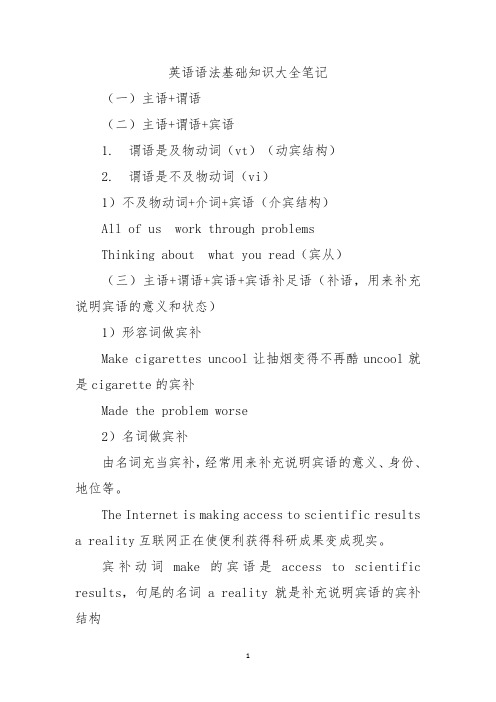
英语语法基础知识大全笔记(一)主语+谓语(二)主语+谓语+宾语1. 谓语是及物动词(vt)(动宾结构)2. 谓语是不及物动词(vi)1)不及物动词+介词+宾语(介宾结构)All of us work through problemsThinking about what you read(宾从)(三)主语+谓语+宾语+宾语补足语(补语,用来补充说明宾语的意义和状态)1)形容词做宾补Make cigarettes uncool让抽烟变得不再酷uncool就是cigarette的宾补Made the problem worse2)名词做宾补由名词充当宾补,经常用来补充说明宾语的意义、身份、地位等。
The Internet is making access to scientific results a reality互联网正在使便利获得科研成果变成现实。
宾补动词make的宾语是access to scientific results,句尾的名词a reality就是补充说明宾语的宾补结构3)动词做宾补以动词原形、不带to的不定式和分词结构为主Make the site seem objective 使网站看起来公正客观宾补动词make后面的宾补为动词seem,这就是我们常说的make+某人/某物+动词原形,表示使某人/某物...He hesitanted make his discovery known将自己的发现公之于众犹豫不决To see a woman driving4)常见的宾补动词A. 宾补常为形容词的动词:make,render,find,drive,get等+adj。
B. 宾补常为形容词的动词:make,appoint,elect,crown等+n5)宾语后置当宾语是一个较为复杂的动词不定式结构或者是一个从句时,为了保持句子平衡,习惯上会将宾语后置,会用it 来冲当形式宾语。
The financial crisis has made it more acceptable to be between jobs or to leave a bad one 金融危机使得工作还是辞退不好的工作变得更容易接受谓语是make,宾语为to be between jobs or to leave a bad one,但由于宾语较长后面还加上more acceptable 的宾补,考虑到句子平衡所以后置了宾语。
高三英语语法知识点总结笔记
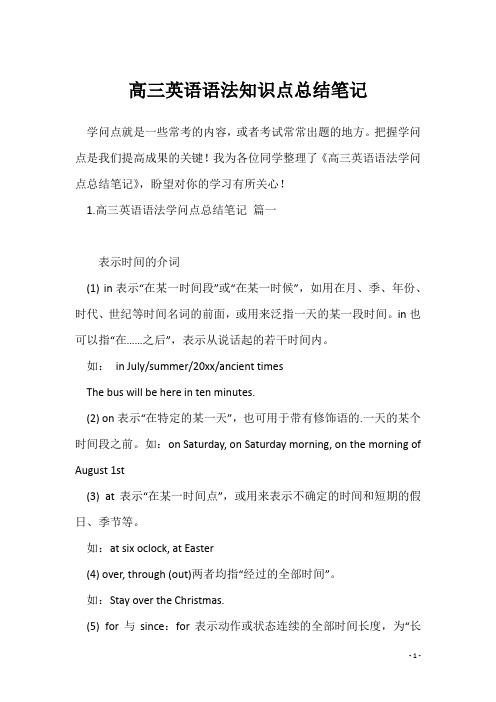
高三英语语法知识点总结笔记学问点就是一些常考的内容,或者考试常常出题的地方。
把握学问点是我们提高成果的关键!我为各位同学整理了《高三英语语法学问点总结笔记》,盼望对你的学习有所关心!1.高三英语语法学问点总结笔记篇一表示时间的介词(1) in表示“在某一时间段”或“在某一时候”,如用在月、季、年份、时代、世纪等时间名词的前面,或用来泛指一天的某一段时间。
in也可以指“在……之后”,表示从说话起的若干时间内。
如:in July/summer/20xx/ancient timesThe bus will be here in ten minutes.(2) on表示“在特定的某一天”,也可用于带有修饰语的.一天的某个时间段之前。
如:on Saturday, on Saturday morning, on the morning of August 1st(3) at表示“在某一时间点”,或用来表示不确定的时间和短期的假日、季节等。
如:at six oclock, at Easter(4) over, through (out)两者均指“经过的全部时间”。
如:Stay over the Christmas.(5) for与since:for表示动作或状态连续的全部时间长度,为“长达……”之意;since用于指从过去特定的某个时刻到说话时为止的一段时间;含有since时间短语的句子要用完成时,但含有for时间短语的句子不肯定要用完成时。
2.高三英语语法学问点总结笔记篇二主语从句不行位于句首的五种状况:(1)if 引导的主语从句不行居于复合句句首。
(2)It is said /reported?结构中的主语从句不行提前。
例如:正确表达:It is said that President Jiang will visit our school next week. 错误表达:That President Jiang will visit our school next week is said. (3)It happens/occurs?结构中的主语从句不行提前。
英语语法知识点【挺好6篇】
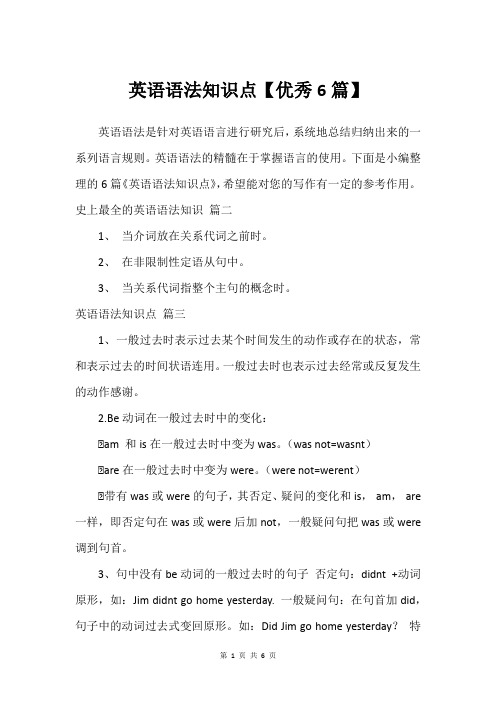
英语语法知识点【优秀6篇】英语语法是针对英语语言进行研究后,系统地总结归纳出来的一系列语言规则。
英语语法的精髓在于掌握语言的使用。
下面是小编整理的6篇《英语语法知识点》,希望能对您的写作有一定的参考作用。
史上最全的英语语法知识篇二1、当介词放在关系代词之前时。
2、在非限制性定语从句中。
3、当关系代词指整个主句的概念时。
英语语法知识点篇三1、一般过去时表示过去某个时间发生的动作或存在的状态,常和表示过去的时间状语连用。
一般过去时也表示过去经常或反复发生的动作感谢。
2.Be动词在一般过去时中的变化:⑴am 和is在一般过去时中变为was。
(was not=wasnt)⑴are在一般过去时中变为were。
(were not=werent)⑴带有was或were的句子,其否定、疑问的变化和is,am,are 一样,即否定句在was或were后加not,一般疑问句把was或were 调到句首。
3、句中没有be动词的一般过去时的句子否定句:didnt +动词原形,如:Jim didnt go home yesterday. 一般疑问句:在句首加did,句子中的动词过去式变回原形。
如:Did Jim go home yesterday?特殊疑问句:⑴疑问词+did+主语+动词原形?如:What did Jim do yesterday?⑴疑问词当主语时:疑问词+动词过去式?如:Who went to home yesterday?动词过去式变化规则:1、一般在动词末尾加-ed,如:pull-pulled,cook-cooked2、结尾是e加d,如:taste-tasted3、末尾只有一个元音字母和一个辅音字母的重读闭音节,应双写末尾的辅音字母,再加-ed,如:stop-stopped4、以“辅音字母+y”结尾的,变y为i,再加-ed,如:study-studied5、不规则动词过去式:am,is-was,are-were,do-did,see-saw,say-said,give-gave,get-got,go-went,come-came,have-had,eat-ate,take-took,run-ran,sing-sang,put-put,make-made,read-read,write-wrote,draw-drew,drink-drank,fly-flew,ride-rode,speak-spoke,sweep-swept,swim-swam,sit-sat英语语法知识点篇四不定代词例句I have no idea about it.对此我一无所知。
最详细的英语语法笔记

实用英语语法笔记第一部分词法Chapter 1. 主谓一致一、概念:主谓一致是指:1)语法形式上要一致,即单复数形式与谓语要一致。
2)意义上要一致,即主语意义上的单复数要与谓语的单复数形式一致。
3)就近原则,即谓语动词的单复形式取决于最靠近它的词语,一般来说,不可数名词用动词单数,可数名词复数用动词复数。
例如:There is much water in the thermos.但当不可数名词前有表示数量的复数名词时,谓语动词用复数形式。
例如:Ten thousand tons of coal were produced last year.二、相关知识点精讲1、并列结构作主语时谓语用复数,例如:Reading and writing are very important.注:当主语由and连结时,如果表示一个单一的概念,即指同一人或同一物时,谓语动词用单数,and 此时连接的两个词前只有一个冠词。
例如:The iron and steel industry is very important to our life. 钢铁工业对我们的生活有重要意义。
2、主谓一致中的靠近原则1)当there be句型的主语是一系列事物时,谓语应与最邻近的主语保持一致。
例如:There is a pen, a knife and several books on the desk. 桌上有一支笔、一把小刀和几本书。
There are twenty boy-students and twenty-three girl-students in the class.班上有二十个男孩,二十三个女孩。
2)当either…or…与neither…nor,连接两个主语时,谓语动词与最邻近的主语保持一致。
如果句子是由here, there引导,而主语又不止一个时,谓语通常也和最邻近的主语一致。
例如:Either you or she is to go. 不是你去,就是她去。
英语语法笔记

第一章词类一、词1.定义:能够运用的最小单位2.10类:名词、动词、代词、介词、形容词、副词、连词、冠词、感叹词、数词(一)名词1.定义:①普通名词②专有名词(首字母要大写)ex:People,China,United Nations.2.单、复数Shops,libraries,wives,knives,clifs规则:①大多数名词的复数直接+S,ex:pens,shops②以o,s,x,ch,sh结尾的单词一般情况下+es特殊:stomach /k/ +sEpoch /k/+s 新时期,新纪元有些以“O”结尾的外来词(如piano)或缩写词(如zoo)直接+S③y类:A.以辅音+y结尾,y →i,+es,ex:familyB.以元音(a,e,i,o,u)+y结尾,+s,ex:key(n) adj④f或fe类:A.直接+s,ex;clif 悬崖,chiefs 首领,酋长,roofsCEO→Chief Executive OfficerB.变f或fe→v+es ex:wives,knives,thief→thievesC.+s,esScarf(+s,es),dwarf(+s,es)小矮人⑤+'s类当字母、数字、单词、符号被看作是字时ex:Your 3's look like 8's. 你写的3像8.She used too many but's&if's.⑥有些字母以改变元音字母来变复数man-men woman-women tooth-teeth goose-geese foot-feet鸡:Cock 公鸡,hen 母鸡,chick 小鸡,chicken 鸡肉牛:Oxen/bull 公牛cow 母牛beef 牛肉mutton 羊肉⑦单复数同形ex:deer, means, species, sheep⑧复合名词A.把结尾词变成复数Ex:grown-ups 成人,motor-hotelsB.把主体名词变成复数Ex:sisters-in-law 嫂子,小姨子brothers-in-law 小叔,小舅子editors-in-law 主编C.把两个组成部分都变成复数man-teacher→men teacherswoman-doctor→women doctors(二)冠词1.定义:放在名词前,帮助说明名词所处的对象2.①定冠②不定冠词a hotel a university an exhibitiona useful book an honest boy an Indian poet注:不定冠词用在单数名词前,a用在辅音开头的名词前(这个字母发音而非指该字母是辅音);The 可用单数名词前,也可用复数名词前(三)代词1.人称代词:I,you,she2.物主代词:①形容词:his,her,their②名词:his,hers相互代词:each other,one another反身代词:oneself,myself,themselves疑问代词:who,which,whose,whom,what不定代词:some,any,all,many,much,little,fewEx: little(否) ,a little (肯)修饰不可数名词There's little water in the cup.杯子里几乎没有水了。
高中英语语法归纳总结笔记简单

高中英语语法归纳总结笔记简单高中英语语法归纳总结笔记是学习英语必备的重要工具。
语法是语言的骨架,掌握好语法规则对提高语言运用能力和表达准确性至关重要。
下面将对高中英语语法的常见知识点进行归纳总结,以便帮助大家更好地掌握。
一、基本句型1. 主语 + 动词主语为句子的中心组成部分,动词表示主语的动作或状态。
例句:Mary sings beautifully.2. 主语 + 动词 + 宾语宾语是指动作的承受者或影响者,可以是名词、代词、动名词或不定式等。
例句:Tom likes apples.3. 主语 + 动词 + 宾语 + 宾补宾补用来补充说明或进一步修饰宾语。
例句:We elected him chairman.4. 主语 + 动词 + 间接宾语 + 直接宾语间接宾语表示动作的得益者,而直接宾语则表示动作的直接对象。
例句:They sent me a gift.二、时态和语态1. 一般现在时一般现在时用来表示经常性的动作或现在的真理。
例句:The sun rises in the east.2. 一般过去时一般过去时用来表示过去发生的动作或状态。
例句:They went to the park yesterday.3. 一般将来时一般将来时用来表示将来要发生的动作或状态。
例句:We will go shopping tomorrow.4. 现在进行时现在进行时用来表示现在正在发生的动作。
例句:I am studying for the exam.5. 过去进行时过去进行时用来表示过去某一时刻正在进行的动作。
例句:He was playing basketball when I saw him.6. 被动语态被动语态表示动作的承受者在句子中的主语位置。
例句:The book was written by him.三、从句从句是指在一个主句中包含其他句子形式的从句,主要有名词性从句、定语从句和副词从句。
英语语法知识点大全
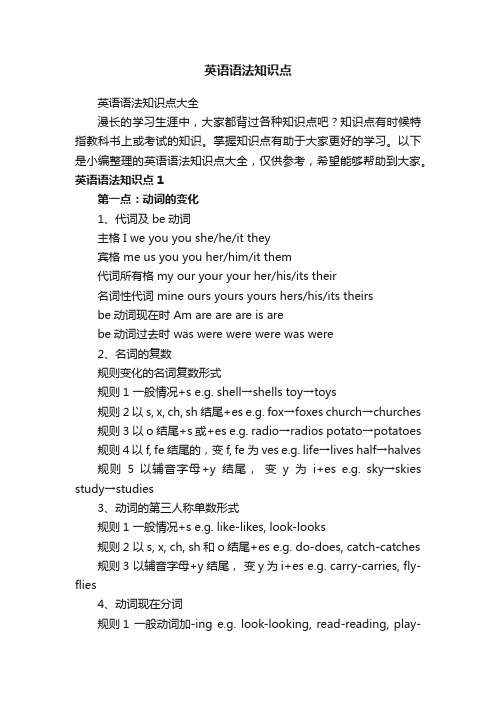
英语语法知识点英语语法知识点大全漫长的学习生涯中,大家都背过各种知识点吧?知识点有时候特指教科书上或考试的知识。
掌握知识点有助于大家更好的学习。
以下是小编整理的英语语法知识点大全,仅供参考,希望能够帮助到大家。
英语语法知识点1第一点:动词的变化1、代词及be动词主格 I we you you she/he/it they宾格 me us you you her/him/it them代词所有格 my our your your her/his/its their名词性代词 mine ours yours yours hers/his/its theirsbe动词现在时 Am are are are is arebe动词过去时 was were were were was were2、名词的复数规则变化的名词复数形式规则1 一般情况+s e.g. shell→shells toy→toys规则2 以s, x, ch, sh结尾+es e.g. fox→foxes church→churches 规则3 以o结尾+s或+es e.g. radio→radios potato→potatoes 规则4 以f, fe结尾的,变f, fe为ves e.g. life→lives half→halves 规则5 以辅音字母+y结尾,变y为i+es e.g. sky→skies study→studies3、动词的第三人称单数形式规则1 一般情况+s e.g. like-likes, look-looks规则2 以s, x, ch, sh和o结尾+es e.g. do-does, catch-catches 规则3 以辅音字母+y结尾,变y为i+es e.g. carry-carries, fly-flies4、动词现在分词规则1 一般动词加-ing e.g. look-looking, read-reading, play-playing规则2 以不发音的字母结尾的单词去e加-ing e.g. make-making, take-taking, arrive-arriving规则3 重读闭音节词结尾,即单词中只有一个元音字母,其后紧跟一个辅音字母的词,双写辅音字母再加-ing e. g. run-running, sit-sitting, get-getting, swim-swimming, stop-stopping5、动词过去式规则动词变化规则1 一般动词加-ed e.g. look-looked, watch-watched, play-played.规则2 以e结尾的加-d e.g. make-maked, arrive-arrived.规则3 以辅音字母y结尾的变y为i加-ed cry-cried, carry-carried.规则4 重读闭音节词结尾,即单词中只有一个元音字母,其后紧跟一个辅音字母的词,双写辅音字母再加-ed stop-stopped 过去式的读音在清辅音后面(除外)读/t/ e.g. walked, jumped在浊辅音和元音后读/d/ e.g. washed, watched在/t/,/d/后读/id/ e.g. waited, hated6、形容词和副词的比较级和最高级比较级规则1 一般加-er e.g. high-higher规则2 以e结尾加-r nice-nicer规则3 以辅音字母加y结尾,变y为i再加-er busy-busier规则4 重读闭音节结尾,双写辅音字母再加-er fat-fatter最高级规则1 一般加-est e.g. high-highest规则2 以e结尾加-st nice-nicest规则3 以辅音字母加y结尾,变y为i再加-est busy-busiest规则4 重读闭音节结尾,双写辅音字母再加--est fat-fattest7、常见缩写:is='s I am=I'm are='reis not=isn't /iznt/ are not=aren't /a:nt/do not=don'tdoes not=doesn'twas='sdid not=didn'tcan not=can'thave='vehas='shave not=haven'thas not=hasn'twill='llwill not=won'tshall not=shan't第二点:将来完成进行时将来完成进行时形式will/shall have been+现在分词用于第一人称,而will have been+现在分词用于其他人称。
英语语法学习笔记

一、名词1、单数变复数①f ves小偷的妻子拿小刀把树叶和狼砍成两半,结束了他的生命。
Thief wife knife leaf wolf half life 补:架子shelf②o+es黑人英雄吃土豆、西红柿等于零。
Negro hero potato tomato zero③Englishman Englishmen Frenchman FrenchmenChinese Chinese Japanese JapaneseAmerican Americans GermanGermans④复合词中单变复(有名词的变名词,无名词的变最后)两个名词:women-teachers men-doctors名词+介词:passers-by lookers-on形容词+名词:chief-editors主编们动词+介词:grown-ups成年人 go-betweens媒人们⑤特殊的:foot feet tooth teethchild children⑥单复同形:sheep deer means(方式) works(作品) series(系列)species(种类)集合名词无复数:cattle people family class government team…2、抽象名词具体化(不可数名词可数名词)即:a+adj.+n.A\an+adj.+shame、success、 (failure)、 surprise、 pity 、pleasure、 honour adventure 、difficulity3、永远不加a\an的名词(永远不可数,即:adj.+n.)Adj.+advice 、progress 、news、 information、 equipment、 fun 、furniture weather4、名词所有格①Tom’s(有生命) book=the book(无生命) of Tom②a friend of my father’s\mine.双重所有格③soldiers’ gun 复数用__s’④表示某人的店铺、家、办公室时,所有格后的中心词常常省略。
英语语法学习笔记-任江江
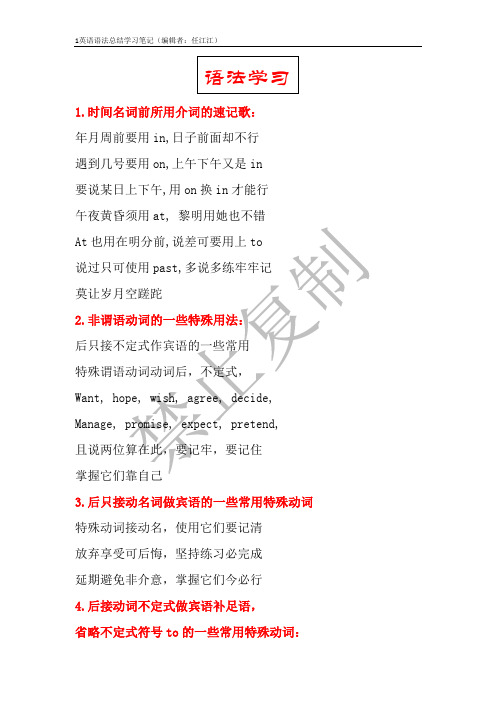
1.时间名词前所用介词的速记歌:年月周前要用in,日子前面却不行遇到几号要用on,上午下午又是in要说某日上下午,用on换in才能行午夜黄昏须用at, 黎明用她也不错At也用在明分前,说差可要用上to说过只可使用past,多说多练牢牢记莫让岁月空蹉跎2.非谓语动词的一些特殊用法:后只接不定式作宾语的一些常用特殊谓语动词动词后,不定式,Want, hope, wish, agree, decide, Manage, promise, expect, pretend,且说两位算在此,要记牢,要记住掌握它们靠自己3.后只接动名词做宾语的一些常用特殊动词特殊动词接动名,使用它们要记清放弃享受可后悔,坚持练习必完成延期避免非介意,掌握它们今必行4.后接动词不定式做宾语补足语,省略不定式符号to的一些常用特殊动词:一些动词要掌握,have, let和make, 此三动词是使役,注意观察听到see, 还有feel和watch,使用它们要仔细,后接宾补略去to, 此点千万要牢记除此之外,还可掌握八字言一感feel, 二听hear, listen to, 三让have, let, make, 四看see, Look at, observe, watch5.动名词在句中的功能及其它动名语法其功能,名词特征有动形主宾表定都可作,动名现分要认清现分不作宾和主,动名作状可不行二词皆可作定语,混为一谈不允许,主谓关系视分词,动名一词无此义。
6.现在分词形式及在句子中的作用(包括过去分词的作用)现在分词真好记,动词后面ing它的作用真不小,可以充当定状表还有宾语补足语,忘记此项不可以7.分词做定语的位置及其他:定分位置有二条,词前词后定分晓单个分词在词前,有时此规有颠倒分词短语在词后,定从和它互对照现分动作进行时,过分动作完成了(注:定分:做定语的分词;定从:定语从句;现分:现在分词;过分:过去分词)8.分词做状语在句中所表示的意义:分词做状语,概有七意义时间和原因,结果与目的方式加伴随,条件常出席且谈其主语,谓语头前的*。
初中英语语法学习笔记整理30页word文档

1 (see 、hear 、notice 、find 、feel 、listen to 、 look at (感官动词)+do eg:I like watching monkeys jump.2 (比较级 + and + 比较级)表示越来越怎么样3 a piece of cake =easy 小菜一碟(容易)4 agree with sb 赞成某人5 all kinds of 各种各样 a kind of 一样6 all over the world = the whole world 整个世界7 along with同……一道,伴随… eg : I will go along with you. 我将和你一起去 the students planted trees along with their teachers. 学生同老师们一起种树8 As soon as 一怎么样就怎么样9 as you can see 你是知道的10 ask for ……求助, 向…要…(直接接想要的东西) eg : ask you for my book11 ask sb for sth 向某人什么12 ask sb to do sth 询问某人某事 ask sb not to do 叫某人不要做某事13 at the age of 在……岁时 eg:I am sixteen I am at the age of sixteen.14 at the beginning of …… ……的起初;……的开始15 at the end of +地点/+时间: 最后,尽头,末尾. eg : At the end of the day16 at this time of year 在每年的这个时候17 be /feel confident of sth /that clause +从句感觉/对什么有信心,自信 eg : I am / feel confident of my spoken English I feel that I can pass the test.18 be + doing :1 现在进行时 2 将来时19 be able to (+ v 原) = can (+ v 原) 能够…… eg : She is able to sing She can sing.20 be able to do sth 能够干什么 eg :she is able to sing.21 be afraid to do (of sth 恐惧,害怕…… eg : I'm afraed to go out at night I'm afraid of dog22 be allowed to do 被允许做什么 eg: I'm allowed to watch TV 我被允许看电视 I should be allowed to watch TV 我应该被允许看电视23 be angry with sb 生某人的气 eg : Don't be angry with me24 be angry with(at) sb for doing sth 为什么而生某人的气25 be as…原级…as 和什么一样 eg : She is as tall as me 她和我一样高26 be ashamed to27 be away from 远离28 be away from 从……离开29 be bad for 对什么有害 eg : Reading books in the sun is bad for your eyes 在太阳下看书对你的眼睛不好30 be born 出生于31 be busy doing sth 忙于做什么事 be busy with sth 忙于……32 be careful 当心;小心33 be different from…… 和什么不一样34 be famous for 以……著名35 be friendly to sb 对某人友好36 be from = come from 来自 eg :He is from Bejing He comes from Bejing Is he from Bejing ? Does he come from Bejing ?37 be full of 装满……的 be filled with 充满 eg: the glass is full of water the glass is filled with water38 be glad+to+do/从句39 be going to + v(原)将来时40 be good at(+doing) = do well in 在某方面善长, 善于……41 be good for 对什么有好处 eg : Reading aloud is good for your English42 be happy to do 很高兴做某事43 be helpful to sb 对某人有好处 eg : Reading aloud is helpful to you 大声朗读对你有好处 Exercising is helpful to your bady 锻炼对你的身体有好处44 be in good health 身体健康45 be in trouble 处于困难中 eg : She is in trouble They are in tronble 46 be interested in 对某方面感兴趣47 be late for = come late to 迟到 eg: Be late for class 上课迟到48 be like 像…… eg : I'm like my mother49 be mad at 生某人的气50 be made from 由……制成 (制成以后看不见原材料)51 be made of 由……制成(制成以后还看得见原材料)52 be not sure 表不确定53 be on a visit to 参观54 be popular with sb 受某人欢迎55 be quiet 安静56 be short for 表**的缩写 eg: 陶 is short for 陶俊杰57 be sick in bed 生病在床58 be sorry to do sth be sorry for sb eg : I am sorry for you59 be sorry to hear that60 be sorry to trouble sb eg : I am sorry to trouble you61 be strict in doing sth 严于做某事 eg : He's strict in obeying noles62 be strict with sb 对某人要求严格 eg: Some students are not strict with them selves 这些学生对自己不严格63 be strict with sb in sth 某方面对某人严格64 be supposed to do 被要求干什么65 be sure 表确定66 be sure of doing sth 对做某事有信心 eg: He is sure of winningI am sure of learning English well67 be sure of sth 对做某事有信心 I'm sure of my head (my teacher 我相信我的大脑68 be sure that sth 对做某事有信心 eg: I'm suer that he can pass the test 我相信他能通过考试69 be sure to do sth一定会做某事eg: We are sure to pass the test 我们一定会通过这次考试 We are sure to learn English well 我们一定能学好英语70 be terrified of + 名/动doing 害怕……71 be terrified to do sth 害怕做某事72 be the same as … 和什么一样73 be used to doing sth 习惯做某事 eg: My father is used to getting up early 我爸习惯早He is used to sleeping in class 他习惯上课睡觉74 be worth doing 值得做什么75 be(feel) afraid to do sth 害怕做某事 be afraid of sth 害怕某物 be afraid that 从句76 because+句子 because of +短语 eg : He was late because he hada headache He was late because of his headache77 begin to do = start to do 开始做某事start…with…=begin…with… 以什么开始什么 eg : Let's begin the game with the song I begin to go home78 between…and… 两者之间79 borrow sth from sb 向……借…… lend sth to sb ( lend sb sth 借给……什么东西 eg : I borrowed a pen from him he lent a pen to me ( he lent me a pen80 both = the same(as) = not different(from) 表相同81 bother 打扰 bother sb to do sth eg : I'm sorry to bother you ,but can you tell me to way to the station 我十分道歉打扰你,但是你能告诉我怎么去车站 the problem has been bothering me for weeks 这个问题困扰了我几个周了 He's bothering me to lend him money82 by the end of 到……为止83 call sb sth eg : We call him old wang84 care 关心 eg : Don't you care about this country's future ?你为什么不关心国家的未来85 catch up with sb 赶上某人86 chat with sb 和某人闲谈 take sb to + 地点带某人去某地87 come in 进88 come over to 过来89 come up with 提出 eg: Can you come up with a good idea 你能想出一个好办法吗?90 communicate with sb 和某人交流91 consider + doing 考虑做什么 eg : Why not consider going to lu zhou 为什么不考虑去泸州?92 dance to 随着……跳舞 eg : She likes dancing to the music 她喜欢随着音乐跳舞93 decide to do sth 决定做某事94 do a survey of 做某方面的调查95 do better in 在……方面做得更好96 do wrong 做错97 Don't forget to do sth 不要忘了做某事98 Don't mind +doing /从句 /名词不要介意……99 each +名(单)每一个…eg : Each student has many books 每一个学生都有一些书100 end up +doing 以……结束101 enjoy +doing喜欢102 escape from 从……逃跑eg: The prisoners have escaped from the prison犯人从监狱里逃跑出来103 expect to do sth 期待做某事104 fall down 摔下来 fall off 从哪摔下来105 fall in love with sb /sth 爱上什么106 far from 离某地远 eg : The school is far from my home107 find +it +adj +to do 发现做某事怎么样108 find sb/sth +adj 发现什么怎么样 eg : I find the book interesting 109 finish 完成+doing(名词)110 fit to sb = be fit for sb 适合某人111 forget to do 没有做而忘了 forget doing 做了而又忘了 eg: Don't forget to go home I forget closing door112 from…to… 从某某到某某 eg: From me to her113 get /have sth down 做完,被(别人)做…eg: I have my hair cut 我理了发(头发被剪了) Tom got his bad tooth pulled out 汤母把他的坏牙拔掉了(被牙医拔掉了)114 get a part-time job= find a part-time job115 get along well with sb = get on well with sb 与某人相处得好116 get along with sb = get on with sb 与某人相处117 get ready for = be ready for为什么而准备eg : I get ready for math I am ready for math118 get sb in to trouble 给某人麻119 get sb to do sth120 get…from… 从某处得到某物121 give a talk 做报告 eg: He is give a tall122 give sth to sb give sb sth 给某人某物123 go fish 钓鱼 go swimming 游泳124 go on to do 去做下一件事 go on doing 继续做这件事125 go out away from go out of126 go to school 上学(用于专业的)go to the school 去学校(不一定是上学)127 good way to 好方法128 hate to do 讨厌没做过的事 hate doing 讨厌做过的事129 have a party for sb 举办谁的晚会130 have a talk 听报告谈一谈131 have been doing 现在完成进行时 You have been talking You have been sleeping since132 have been to …( 地方)…去过某过地方 have gone to (地方)去了某地还没回来133 have fun +doing 玩得高兴134 have sth to do 有什么事要做 eg: I have a lot of homework to do 我有很多家庭作业要做 I have nothing to do 我没什么事情做135 have to do sth 必须做某事136 have trouble (problem) (in) doing sth 做什么事情有麻烦137 have…time +doing138 have…(时间)…off 放……假 eg: I have month off 我请一个月得假139 hear sb +do/doing 听见某人做某事/正在做某事140 help a lot 很大用处141 help sb with sth \one's sth 帮助某人某事(某方面) help sb (to) do sth 帮助某人做某事142 hope to do sth 希望做某事143 How about(+doing) = What about(+doing)144 how do you like = what do you think of 你对什么的看法145 if : 是否=wether eg: I don't know if (wether) I should go to the party 我不知道我是否应该去参加晚会 He don't know if (wether) we will arrive on time tomorrow morning 他不知道我们明天早上是否能准时到达146 if :如果,假如(全部接一般时态)+条件语态从句 eg: I'll go to LuZhou if it does't rain 假如明天不下雨,我就去泸州 If they change the plan they will let me know 假如他们要改变计划,他们会让我知道的 I'll go to England ,if I have enough money next year 如果我明年由足够的钱,我就要去英国147 in one's opinion = sb think 某人认为148 in some ways 在某些方面149 in the end = finally(adv) 最后150 in the north of… 什么在什么的北方(north 北 sowth 南 west 西east 东)151 in the sun 在太阳下152 increase 增加 eg : They've increased the prece of petrol by 3% 他们把石油价增加了3%153 instead of +(名)代替 eg: I'd like an apple instead of a pear 我想要苹果,而不要梨子 I like English instead of math 我喜欢英语而不喜欢数学154 introduce sb to sb 介绍某人给某人 introduce oneself 自我介绍155 invite sb to do sth 邀请某人做某事156 It takes sb sometime to do sth 做某人花掉某人多少时间 eg : It took me 5 minutes to do my homework It takes me half an hour to cook157 It's +adj +for sb to do sth 对某人来说做某事怎么样158 It's +adj +to do 做某事怎么样159 It's +adj for sb 对于某人来说怎么样 It's +adj of sb 对某人来说太怎么样160 It's +adj(for sb) to do(对某人来说)做某事怎么样 It's +adj of sb to do sth 对某人来说做某事太怎么样 eg : It's nice of you to help me with my English161 It's a good idea for sb to do sth 对…… 来说是个好主意162 It's important to sb 对某人来说很重要 eg: It's important to me 163 It's time to do sth It's time for sth 到了该去做某事的时间 eg : It's time to have class It's time for class 该去上课了164 join = take part in 参加165 just now 刚才166 keep +sb /sth +adj /介词短语让什么保持什么样?167 keep out 不让…… 进入168 keep sb adj 让……保持…… eg: I want to keep my mother happy keep healthy 保持健康169 key to +名词表示:某物的钥匙或某题的答案170 key to… anser to … key 可以是答题或钥匙171 laugh at… 取笑…… eg : Don't langh at others We langhed at the joke172 learn by oneslfe 自学173 learn from sb 向某人学习 eg: We should learn from Lei Feng 174 learn to do sth 学做某事175 let sb do sth 让某人做某事176 Let sb down 让某人失望 eg : We shouldn't let our farents down 我们不应该让我们的父母失望177 live from :离某地远178 live in +大地方 /at +小地方居住在某地 eg: I live in LuZhou She lives at XuanTan179 look after = take care of 照顾照看180 lose one's way 谁迷路 eg : Lose your way 你迷路181 make a decision to do sth 决定做某事182 make friends with sb 和谁成为朋友 eg : I want to make friends with you183 make it early 把时间定的早一点184 make on exhibition of oneself 让某人出洋相185 make sb /n +n 使什么成为什么 eg : I made her my step moller I made you my wife186 make sb /sth +adj 使某人(某物)怎么样 eg : You must made your bed clean187 make sb /sth adj 使某人/某物怎么样188 make sb do sth 让某人做某事 eg : I made him write 我以前让他写189 make up be made up of (被动语态)由……组成190 make…difference to…191 mind sb to do mind one's doing 介意……做什么192 most +名 most of +代193 much too +形容词194 must be 一定195 need +名词需要……196 need sb do sth 需要某人做某事197 need to do (实义动词) need do (情态动词)199 no +名词200 not anymore = no more 再也不…… eg: He didn't cry any more / He cried no more 他再也不哭201 not… (形、副)at all eg: He's not tall at all. She doesn't junp far at all202 not…at all 一点都不203 not…either 表否定,也不 eg : I don't japanse either. I don't have sister, either 我也没有姐姐204 not…until 直到……才…… eg: I didn't sleep until my mother came back . The child didn't stop crying until I give her sugar205 offer / provide sb with sth 给某人提供206 offer sb sth / offer sth to sb 提供什么东西给某人 eg : I offer you water / I offer water to you 我给你提供水207 on one's way to…在去……的路上208 on the one hand 一方面 on the other hand 另一方面209 on the phone = over the phone 用电话交谈210 on time 准时 in time 及时211 one day =some day =someday 一天,将来有一天212 one of +可数名词的复数形式213 one to another 一个到另一个214 over and over again一遍又一遍的 eg : He cleaned the floor over and over again215 part-time job 兼职工作 full-time job 全职工作216 pay for…付……钱 pay the bill 开钱,付钱217 please +do218 please help yourself 请随意219 be pleased with sb 对某人感到满意220 pour into 川流不息的涌入,源源而来221 practice +doing 练习做某事222 prefer sth to sth 相对……更喜欢……eg : I prefer physics to chemisty. 在物理和化学中,我更喜欢物理 prefer doing to sth 更喜欢去做…不愿意去做…eg: He prefers riding a bike to diving .他更喜欢骑自行车,不开小车 prefer to do sth rather than do sth 宁愿做…也不愿 eg: My unde prefers to buy a now car rather than repaiv the used one. 我叔叔更喜欢买新的车,也不去修旧车。
英语语法笔记大全
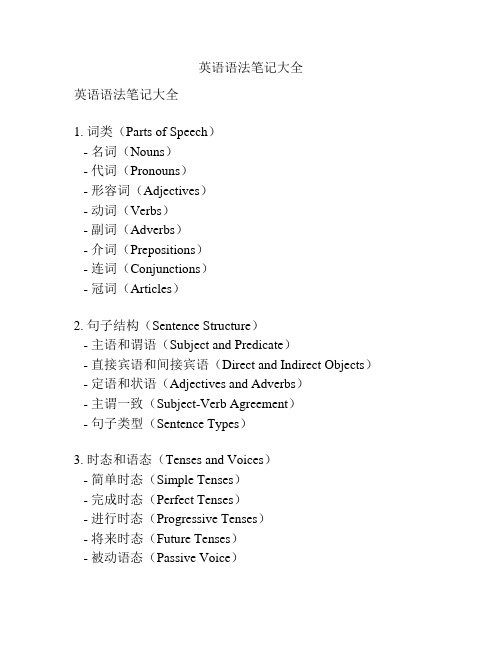
英语语法笔记大全英语语法笔记大全1. 词类(Parts of Speech)- 名词(Nouns)- 代词(Pronouns)- 形容词(Adjectives)- 动词(Verbs)- 副词(Adverbs)- 介词(Prepositions)- 连词(Conjunctions)- 冠词(Articles)2. 句子结构(Sentence Structure)- 主语和谓语(Subject and Predicate)- 直接宾语和间接宾语(Direct and Indirect Objects) - 定语和状语(Adjectives and Adverbs)- 主谓一致(Subject-Verb Agreement)- 句子类型(Sentence Types)3. 时态和语态(Tenses and Voices)- 简单时态(Simple Tenses)- 完成时态(Perfect Tenses)- 进行时态(Progressive Tenses)- 将来时态(Future Tenses)- 被动语态(Passive Voice)4. 句子成分(Sentence Elements)- 主语(Subject)- 谓语(Predicate)- 宾语(Object)- 补语(Complement)- 状语(Adverbial)5. 修饰语(Modifiers)- 限定词(Determiners)- 修饰词(Modifiers)6. 从句(Clauses)- 名词性从句(Noun Clauses)- 定语从句(Adjective Clauses)- 副词从句(Adverbial Clauses)7. 并列句(Compound Sentences)- 并列连词(Coordinating Conjunctions)8. 复合句(Complex Sentences)- 主从连词(Subordinating Conjunctions)9. 标点符号(Punctuation)- 句号(Period)- 逗号(Comma)- 隔句号(Semicolon)- 问号(Question Mark)- 感叹号(Exclamation Mark)- 引号(Quotation Marks)- 冒号(Colon)- 括号(Parentheses)以上是英语语法的主要内容,通过系统地学习和掌握这些知识点,可以帮助提高英语写作和口语的准确性和流畅性。
小学英语语法归纳总结笔记

小学英语语法归纳总结笔记一、名词(Noun)名词可分为可数名词和不可数名词。
1. 可数名词(Countable Nouns)可数名词可以用单数和复数形式表示。
在复数形式中,我们通常在名词的末尾加上-s或-es。
例如:- dog(狗)-- dogs(狗)- cat(猫)-- cats(猫)- bus(公交车)-- buses(公交车)- box(盒子)-- boxes(盒子)2. 不可数名词(Uncountable Nouns)不可数名词一般只有单数形式,不能用于复数。
例如:- water(水)- milk(牛奶)- sugar(糖)- information(信息)二、代词(Pronoun)代词用于代替名词,分为人称代词、物主代词、指示代词、疑问代词和不定代词。
1. 人称代词(Personal Pronouns)人称代词用于代替人或物。
例如:- I(我)- you(你)- he(他)- she(她)- it(它)- we(我们)- they(他们/她们/它们)2. 物主代词(Possessive Pronouns)物主代词用于表示所属关系。
例如:- mine(我的)- yours(你的)- his(他的)- hers(她的)- its(它的)- ours(我们的)- theirs(他们的/她们的/它们的)3. 指示代词(Demonstrative Pronouns)指示代词用于指示特定的人或物。
例如:- this(这个)- that(那个)- these(这些)- those(那些)4. 疑问代词(Interrogative Pronouns)疑问代词用于提问。
例如:- who(谁)- what(什么)- which(哪一个)5. 不定代词(Indefinite Pronouns)不定代词用于指代不确定或不特定的人或物。
例如:- somebody(某人)- anybody(任何人)- something(某物)- anything(任何事物)三、动词(Verb)动词表示动作、状态或存在。
- 1、下载文档前请自行甄别文档内容的完整性,平台不提供额外的编辑、内容补充、找答案等附加服务。
- 2、"仅部分预览"的文档,不可在线预览部分如存在完整性等问题,可反馈申请退款(可完整预览的文档不适用该条件!)。
- 3、如文档侵犯您的权益,请联系客服反馈,我们会尽快为您处理(人工客服工作时间:9:00-18:30)。
英语语法笔记参考资料:《英语语法大全》、《新东方白易礼:大学英语语法笔记》、《英语语法讲义》(高丕永,上海工商外国语学院英语系)第一部分词法Chapter 1. 主谓一致一、概念:主谓一致是指:1)语法形式上要一致,即单复数形式与谓语要一致。
2)意义上要一致,即主语意义上的单复数要与谓语的单复数形式一致。
3)就近原则,即谓语动词的单复形式取决于最靠近它的词语,一般来说,不可数名词用动词单数,可数名词复数用动词复数。
例如:There is much water in the thermos.但当不可数名词前有表示数量的复数名词时,谓语动词用复数形式。
例如:Ten thousand tons of coal were produced last year.二、相关知识点精讲1、并列结构作主语时谓语用复数,例如:Reading and writing are very important.注:当主语由and连结时,如果表示一个单一的概念,即指同一人或同一物时,谓语动词用单数,and 此时连接的两个词前只有一个冠词。
例如:The iron and steel industry is very important to our life. 钢铁工业对我们的生活有重要意义。
2、主谓一致中的靠近原则1)当there be句型的主语是一系列事物时,谓语应与最邻近的主语保持一致。
例如:There is a pen, a knife and several books on the desk. 桌上有一支笔、一把小刀和几本书。
There are twenty boy-students and twenty-three girl-students in the class.班上有二十个男孩,二十三个女孩。
2)当either…or…与neither…nor,连接两个主语时,谓语动词与最邻近的主语保持一致。
如果句子是由here, there 引导,而主语又不止一个时,谓语通常也和最邻近的主语一致。
例如:Either you or she is to go. 不是你去,就是她去。
Here is a pen, a few envelops and some paper for you. 给你笔、信封和纸。
3、谓语动词与前面的主语一致当主语有with, together with, like, except, but, no less than, as well as 等词组成的短语时,谓语动词与前面的主语部分一致。
例如:The teacher together with some students is visiting the factory. 教师和一些学生在参观工厂。
He as well as I wants to go boating.他和我想去划船。
4、谓语需用单数的情况1)代词each以及由every, some, no, any等构成的复合代词作主语时,或主语中含有each, every时, 谓语需用单数。
例如:Each of us has a tape-recorder. /There is something wrong with my watch.2)当主语是一本书或一条格言时,谓语动词常用单数。
例如:The Arabian Night is a book known to lovers of English.3)表示金钱,时间,价格或度量衡的复合名词作主语时,通常把这些名词看作一个整体,谓语一般用单数。
例如:Three weeks was allowed for making the necessary preparations. /Ten Yuan is enough.5、指代意义决定谓语的单复数1)代词what, which, who, none, some, any, more, most, all等词的单复数由其指代的词的单复数决定。
2)集体名词作主语时,谓语的数要根据主语的意思来决定。
如family, audience, crew, crowd, class, company, committee 等词后,谓语动词用复数形式时强调这个集体中的各个成员,用单数时强调该集体的整体。
例如:His family are music lovers.但集合名词people, police, cattle, poultry等在任何情况下都用复数形式。
例如:Are there any police around? 附近有警察吗?3)有些名词,如variety, number, population, proportion, majority等有时看作单数,有时看作复数。
例如:A number of +名词复数+复数动词:A number of books have lent out./ The majority of the students like English.The number of +名词复数+单数动词:The number of books is 53 .6、与后接名词或代词保持一致的情况1)用half of, most of, none of, heaps of, lots of, plenty of 等引起主语时,谓语动词通常与of后面的名词/代词保持一致。
例如:Most of his money is spent on books. 他大部分的钱化在书上了。
Most of the students are taking an active part in sports. 大部分学生积极参与体育运动。
2)用a portion of, a series of, a pile of, a panel of 等引起主语时,谓语动词通常用单数。
例如:A series of accidents has been reported. 媒体报道了一连串的事故。
A pile of lots was set beside the hearth. 炉边有一堆木柴。
3)如many a 或more than one 所修饰的短语作主语时,谓语动词多用单数形式。
但由more than…of 作主语时,动词应与其后的名词或代词保持一致。
例如:Many a person has read the novel.许多人读过这本书。
More than 60 percent of the students are from the city.百分之六十多的学生来自这个城市。
Chapter 2. 动词的时态一、概念:英语的实义动词有以下五种形式:(1) 动词原形:动词原形在句子中形式不变。
主要用于主语为非第三人称单数的一般现在时,情态动词之后,或根据语法规定必须用动词原形的其他情况。
(5) 过去分词:主要用于完成时态,或语法规定的其他情况。
字母组合的不规则动词有一定的规律。
如:weep→wept, sleep→slept, sweep→swept。
化来实现的。
为了学习的方便,人们把时间分为四个阶段:“现在、过去、将来、过去将来”。
英语动词所表示的动作在以上每个时间段中分别有四种状态:一般、进行、完成和完成进行,因此英语有16种时态。
以do为例,列表如将来进行时、现在完成时、过去完成时、将来完成时、现在完成进行时和过去完成进行时。
其他时态很少单独使用。
下面我们把各种时态的构成和用法做一个全面的介绍。
二、相关知识点精讲:1、一般现在时(1)构成:通常以动词原形表示。
主语为第三人称单数时,用现单三形式。
注意:have 作为行为动词则只能按照行为动词的规则变化。
1)表示经常性或习惯性的动作,常与often, usually, always, sometimes, every day, once a week, on Sundays, never 等表示经常性或习惯性的时间状语连用。
例如:I leave home for school at 7 every morning. 每天早上我七点离开家。
2)表示客观真理,客观存在,科学事实或用于强调动作的永久性、经常或反复性。
例如:The earth moves around the sun. 地球绕太阳转动。
/Shanghai lies in the east of China. 上海位于中国东部。
When Winter comes, can Spring be far behind? 冬天来了,春天还会远吗?(英国浪漫主义诗人雪莱的名句。
) Beauty is truth, truth beauty. 美即真理,真理即美。
(英国浪漫主义诗人济慈的名句。
)3)表示格言或警句。
例如:Pride goes before a fall.骄者必败。
注:此用法如果出现在宾语从句中,即使主句是过去时,从句谓语也要用一般现在时。
例如:Columbus proved that the earth is round. 哥伦布证实了地球是圆的。
4)表示现在时刻的现状、性质、状态、能力、性格、个性。
例如:Ann writes good English but does not speak well. 安英语写得不错,讲的可不行。
注:一般不用进行时的动词,它们用一般现在时表示现在进行时①表示心理状态的词:accept, agree, allow, believe, care, dislike, fear, forget, hate, know, like, love, mean, mind, need, prefer, realize, remember, respect, understand, want, wish等。
还有admit, decide, permit, promise, receive, refuse等。
②感官动词和表示状态的动词一般不用进行时。
系动词:如hear, look, notice, see, smell, sound, taste等词。
表示状态的词:be, belong to, exist, have, remain, seem, stay等词。
例如:I see him now,he’s talking to a girl. 我看见他了,他正在和一个女孩说话The warships belong to the navy and the tanks belong to the army. 军舰属于海军,坦克属于陆军。
The tea tastes fresh. 这茶味道很新鲜。
5)少数动词如go, come, leave, arrive, begin, start, be 等的一般现在时可以表示按规定、计划或安排预计要发生的事情。
